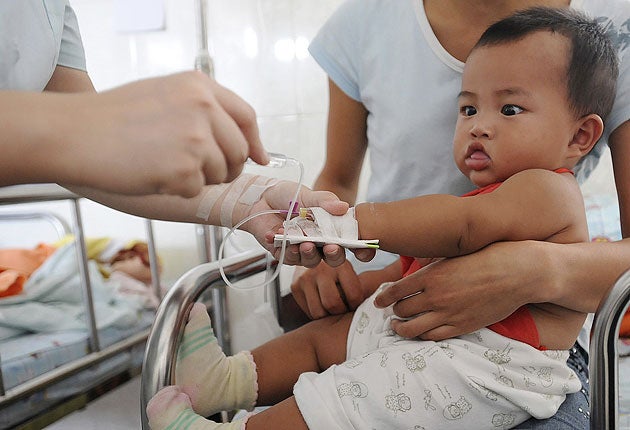13,000 infants sick in China milk scandal

Your support helps us to tell the story
From reproductive rights to climate change to Big Tech, The Independent is on the ground when the story is developing. Whether it's investigating the financials of Elon Musk's pro-Trump PAC or producing our latest documentary, 'The A Word', which shines a light on the American women fighting for reproductive rights, we know how important it is to parse out the facts from the messaging.
At such a critical moment in US history, we need reporters on the ground. Your donation allows us to keep sending journalists to speak to both sides of the story.
The Independent is trusted by Americans across the entire political spectrum. And unlike many other quality news outlets, we choose not to lock Americans out of our reporting and analysis with paywalls. We believe quality journalism should be available to everyone, paid for by those who can afford it.
Your support makes all the difference.The number of Chinese infants sick in hospital after drinking tainted milk formula doubled to nearly 13,000 and Premier Wen Jiabao threatened harsh punishment for culprits in the latest blight on the "made-in-China" brand.
Four deaths have been blamed on the toxic milk powder causing kidney stones and agonising complications, and a string of Asian countries have banned or recalled Chinese milk products.
The Health Ministry said the number of children hospitalised due to milk powder contaminated with the industrial chemical melamine had risen from a previously announced total of 6,244 - which included many who had left hospital - to 12,892, including 104 in a serious condition.
More than 1,500 had already left hospital and nearly 40,000 with milder symptoms "received clinical treatment and advice" before going home.
The jump to more than 54,000 affected children was announced late on Sunday, escalating the scandal that has again shaken trust in Chinese products following last year's scares over toxic and shoddy goods ranging from toothpaste and drugs to pet food and toys.
Melamine has also been found in cartons of milk and some dairy exports, but no illnesses from those sources have been reported.
Wen visited hospitals in the national capital in a bid to reassure an anxious public that the government was acting.
"The public is worried, doctors are worried, and we're also worried," he told parents and staff, according to the state-run Xinhua news agency.
"The most crucial point is that after a clean-up there can be no problems at all with newly produced milk products. If there are fresh problems, they must be even more sternly punished under the law."
China's food quality watchdog has said it found melamine in nearly 10 percent of milk and drinking yoghurt samples from three major dairy companies: Mengniu Dairy Co, the Inner Mongolia Yili Industrial Group and the Bright group.
Nitrogen-rich melamine can be added to watered-down milk to fool quality checks, which often use nitrogen levels to measure protein.
China's dairy producers face a "crisis of confidence" that will need strong government steps to cure, said Lao Bing, manager of a Shanghai-based dairy investment company.
"How long the industry takes to revive will depend on how vigorous those steps are," he said. "Consumers will start rebuying in a month or two if they feel sure the government is undertaking a vigorous clean-up ... Exports will take longer. This will have a major impact."
Japan's Marudai Food Co. Ltd withdrew buns made with milk supplied by Yili, a Marudai official said on Monday, adding there had been no reports of illness from the buns. Marudai shares fell 14 percent on Monday after the recall.
A spokesman for Japan's Nissin said that group has also recalled products with Chinese dairy ingredients, again without reports of any related sickness.
Other markets that have that have banned or recalled Chinese milk products include Brunei, Singapore, Malaysia, Hong Kong and Taiwan.
Even White Rabbit Creamy Candy, a popular Chinese brand of milk sweet, was contaminated with melamine, Singapore's Agri-Food and Veterinary Authority warned on Sunday.
Over the weekend a three-year-old Hong Kong girl was found to have a kidney stone after drinking a milk product tainted by melamine, making her the territory's first suspected victim.
But the most pressing worry remains in China.
Parents have crowded the country's hospitals and demanded redress since officials and the Sanlu Group, the country's biggest maker of infant milk powder, disclosed the threat.
Sanlu knew of but did not publicly disclose the problem for at least a month, throughout August when Beijing hosted the Olympic Games, officials have said.
The government has promised free treatment for stricken children, but some parents said they worried about costs and long-term complications.
Zhou Zhijun, from south China's Hunan province, said she took her wailing, increasingly thin daughter to hospitals at least three times from June to late August before doctors diagnosed a kidney stone.
"All those visits and checks cost 20,000 yuan ($2,920), and I still don't know who will pay for that," she said, adding that her 15-month-old baby had drunk Sanlu milk powder. "Also what if there are complications and problems later? Who'll pay for that?"
Premier Wen said dairy products that passed safety tests would be labelled so consumers can "be at ease".
But the Chinese Ministry of Agriculture said despairing farmers were dumping milk and killing cattle after companies stopped buying their supplies. The ministry promised subsidies to help struggling milk farmers.
Join our commenting forum
Join thought-provoking conversations, follow other Independent readers and see their replies
Comments